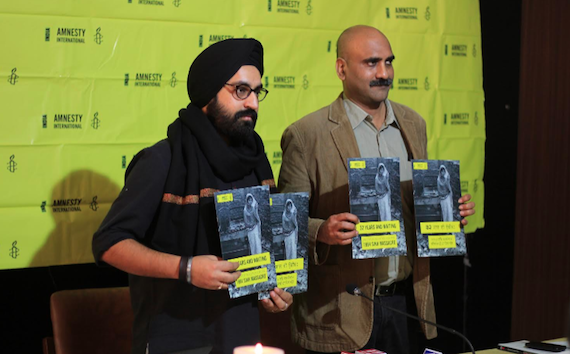Chandigarh: A Special Investigation Team (SIT) formed by the central government must not waste the opportunity to deliver justice for the 1984 Sikh massacre, said Amnesty International India today at the Chandigarh launch of a campaign digest on the massacre.
Sanam Sutirath Wazir, Campaigner at Amnesty International India and senior journalist Manoj Mitta addressed a press conference at Press Club, Chandigarh today to launch the aforesaid campaign digest.
Titled “32 years and waiting: An era of injustice for the 1984 Sikh massacre’’, the campaign digest outlines the cover up that followed the massacre and the status of various official investigations over the last 32 years. The digest also carries personal accounts of survivors.
Sanam Sutirath Wazir (L) and Manoj Mitta during the press conference
The Delhi police had closed investigations into hundreds of cases after the massacre, citing a lack of evidence. A special investigation team (SIT) constituted by the central government in January 2015 to re-investigate cases related to the massacre, has made slow progress. In November, it had identified 58 cases for reinvestigation.
“The SIT raised hopes among victims and survivors that they would finally get justice. But the SIT’s apparent lack of transparency so far has been disturbing,” said Sanam Sutirath Wazir, Campaigner at Amnesty International India.
The SIT has the authority to file charges against accused persons where there is sufficient available evidence. It was originally given six months to complete this exercise, but received extensions in August 2015 and August 2016. It is now slated to complete its investigation in February 2017, two years after it was set up.
“In June 2016, Amnesty International India and a range of prominent activists, journalists, lawyers and political leaders made a series of recommendations related to effective investigation, comprehensive reparations and legal reforms, to be submitted to the Ministry of Home affairs”, said Sanam Sutirath Wazir.
“Since November 2014, over 600,000 people, most of them from Punjab have supported Amnesty International India’s campaign demanding justice for the victims of the massacre”, he added.
A short film on the life of Darshan Kaur, a survivor of the massacre, was also screened at the event. Darshan Kaur, who was 21 years old during the violence, lost her husband and 12 relatives.
Responding to a query in this regard, Sanam Sutirath Wazir said that though the Amnesty’s campaign was limited to Delhi so far but they would extend it to other places also where Sikhs were massacred during November 1984.
Amnesty India on Question of Sikh Genocide 1984:
On being asked by the Sikh Siyasat News (SSN) that it was significant to recognise the true nature of a crime and now when about a dozen cities in United States have issued official proclamation that November 1984 events as “GENOCIDE”, would Amnesty consider to extend such recognition, both the panelists – Manoj Mitta and Sanam Sutirath Wazir did not extend any satisfactory answer.
Manoj Mitta said that he was not part of Amnesty actively so he can not respond in this regard on Amnesty’s behalf. He added that today’s panel did not possess the requisite authority to respond to this query.
He, however, added that the events of November 1984 were unique in terms of scale and intensity of the violence as well as the participation of the state apparatus. He said that in his co-authored book (When a Tree Shook Delhi) they (Manoj Mitta and H S Phoolka) did not use the term ‘riot’ to refer to the events of 1984 rather they had use the term carnage or pogrom for it.
Amnesty campaigners did not respond to this question during the press conference.
After this S. Gurpit Singh of Kendri Sri Guru Singh Sabha requested the Amnesty India to consider the case of Sikh Genocide 1984 just like it did in case of Tamil genocide. “From today’s platform I would request Amnesty India to consider the case of Sikh Genocide 1984 and make a recommendation to the United Nations Human Rights Commission (UNHRC) to recognise the fact of Sikh Genocide 1984” Gurpreet Singh said.
Notably, Amnesty uses the term ‘massacre’ to describe the events of Sikh Genocide of November 1984.

